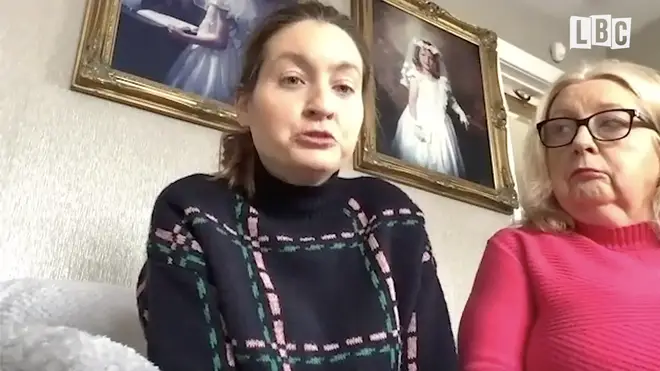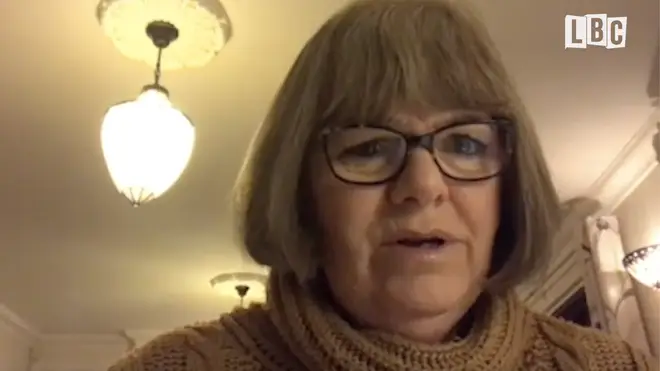
Nick Abbot 12am - 1am
14 February 2021, 11:53 | Updated: 14 February 2021, 12:06

Learning disabled facing 'postcode lottery' for Covid vaccine
Learning disabled people in the UK are facing a 'postcode lottery' to get a Covid vaccine, despite being more at risk of dying from the virus, LBC has been told.
Figures have shown that people with a learning disability are six times more likely to die from coronavirus than the general population.
Shockingly, for adults between 18 to 34 are up to thirty times more likely to lose their lives, meaning for those living with a disability and their families it really is a case of life and death for them to get their jabs.
Over 14 million Brits have now received at least one jab, but there there are some in care homes, with complex needs who are still waiting for a vaccine - despite their care workers having one.
Read more: Domestic and international vaccine passports 'being considered', Raab tells LBC
Even more worrying for families is that those with a mild or moderate learning disability aren’t on the priority list at all, even though they made up 65% of all learning disabled deaths from Covid-19 in the first wave.
Different areas in the country have different rules on who is eligible, meaning it is postcode lottery on who will get one. Some health authorities, like Kent and Medway are going to give all people with a learning disability a priority vaccine.

This has led to confusion really about where people with a learning disability, if at all, slot into the prioritisation list, but despite the risks there isn’t uniform guidance on when this vulnerable group should get a jab.
Emma from Liverpool has a learning disability and cerebral palsy and was told by her doctors she wouldn’t be getting priority access to the vaccine.
The 36-year-old said: “Everyone feels left out, they’re getting upset as well.
Read more: Clinically vulnerable and over-65s offered Covid jab from Monday
Watch: Barring travel 'justified' if vaccine passport introduced, professor says
“Some people have had it and some people haven’t.
"And we just feel like we’re being treated differently. We speak to the staff about it but they can only do as much as they can. "
Kevin’s brother Nigel had brain damage and was 60 years old when he lost his life back in April.
“He was brain damaged at birth and lived a full and enjoyable life, and just the week before I took him out for lunch and were talking about the virus and he was fully aware what it was.

“When he started with symptoms and they got worse, he didn’t want any fuss.”
He added: “He just thought it was a cough that was going to go away and he was irritated by it, but he just increasingly got worse and it was about a week after that he went into hospital and he died within five days.”
Nigel had been used to being surrounded by his loving family, but the strict lockdown restrictions meant Kevin wasn’t allowed to be at his bedside. His sister was allowed to be with him, until she herself got the virus.
Currently guidelines mean only older people with a learning disability and those with Down’s Syndrome are in the top four priority groups, so they should have been offered a vaccine by tomorrow.
Then those with ‘severe and profound’ learning disabilities are in category 6, but Learning Disability England say individual GPs aren’t consistent on this guidance, meaning it has been left down to the local healthcare professionals to determine whether someone with a learning disability should have the vaccine or not.

Jo Fisher, from West Sussex, has had to fight for her 27-year-old son, who’s in a care home, to get the vaccine.
“The journey to the vaccine has been really, really stressful,” she said.
“You see it on the news and you hear of all these people dying and they’re in care homes and you just think ‘oh god, my son’s in a care home, when’s he going to get this, and why are people not talking about it?’”
Campaigners have told me they see it as blatant discrimination.
Edel Harris is the head of the learning disabilities and autism charity, Mencap - who are campaigning for those who aren’t prioritised yet to make sure they don’t die.
She said that if it was made clearer in JCVI guidelines where those with a learning disability fit in the priority, then it would mean local GPs wouldn't have to be making the decisions themselves.

Widespread confusion over vaccine for those with learning disabilities
This is a fast moving situation as the rollout is underway but LBC understands legal proceedings have even been launched against the Health Secretary, Matt Hancock, on the lack of prioritisation for people with learning disabilities.
Elizabeth Cleaver, from Bindmans LLP, said they’re arguing people with a learning disability are being discriminated against, and thinks there is other evidence that needs to be considered.
"We don't accept the Secretary of State's response when they say that we've had to accept what the JCVI says," she added.
And the latest with the case is that the Secretary of State does not accept that priority access should be granted to all adults with learning disabilities.
The Department for Health and Social care says they cannot comment on potential legal proceedings, but the JCVI have looked at extensive data on COVID19 deaths, including people with a learning difficulty.